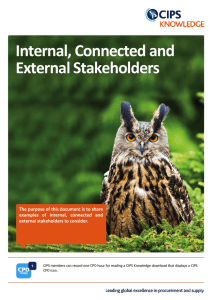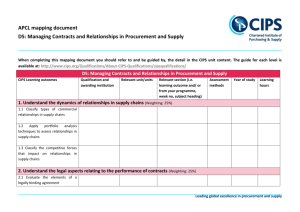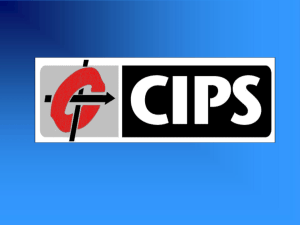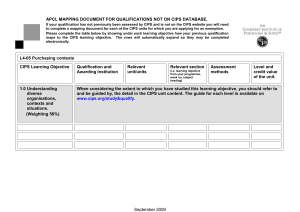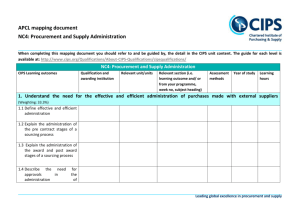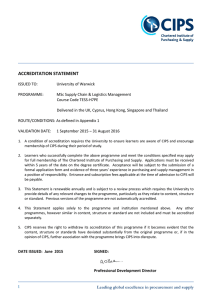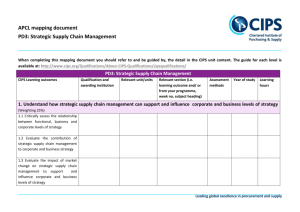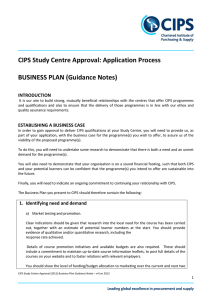CIPS - Digital Education Resource Archive (DERA)
advertisement
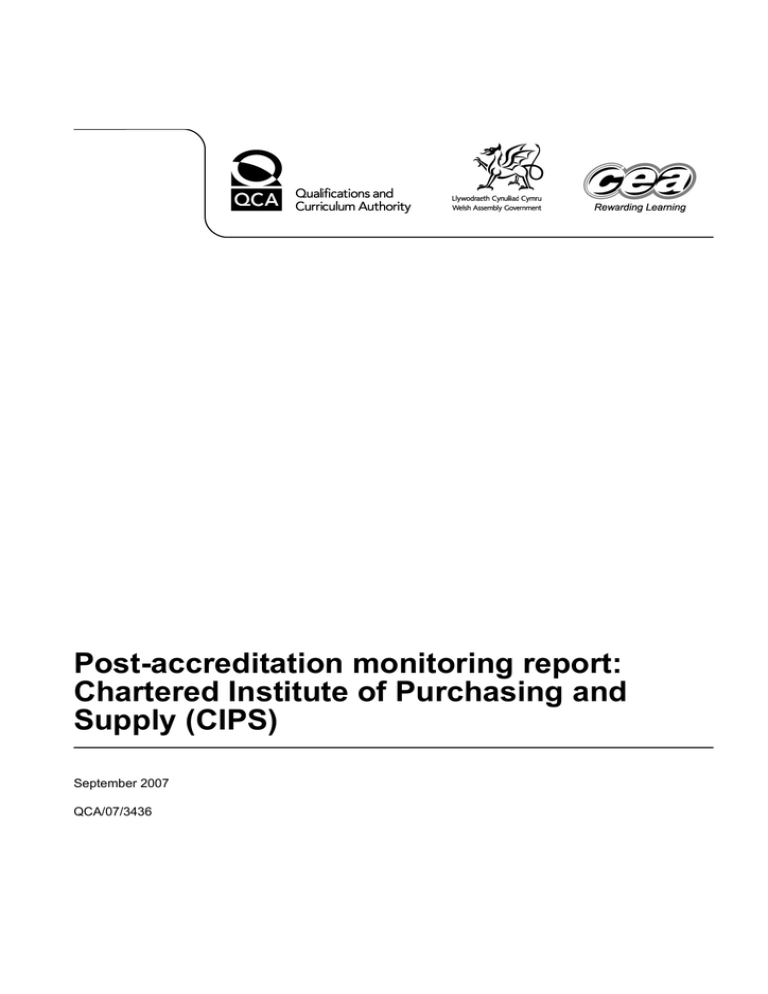
Post-accreditation monitoring report: Chartered Institute of Purchasing and Supply (CIPS) September 2007 QCA/07/3436 Awarding body monitoring report: CIPS Contents Introduction ................................................................................................................................... 3 Regulating external qualifications.............................................................................................. 3 Banked documents.................................................................................................................... 3 About this report ........................................................................................................................ 4 About CIPS................................................................................................................................ 4 Corporate governance .................................................................................................................. 5 Findings..................................................................................................................................... 5 Accreditation conditions............................................................................................................. 5 Observations ............................................................................................................................. 6 Resources and expertise............................................................................................................... 7 Findings..................................................................................................................................... 7 Accreditation conditions............................................................................................................. 9 Observations ............................................................................................................................. 9 The quality assurance and control of independent assessment.................................................. 10 Findings................................................................................................................................... 10 Accreditation conditions........................................................................................................... 13 Observations ........................................................................................................................... 13 Determination and reporting of results ........................................................................................ 14 Findings................................................................................................................................... 14 Accreditation conditions........................................................................................................... 14 Observations ........................................................................................................................... 14 Registration and certification ....................................................................................................... 15 Findings................................................................................................................................... 15 Accreditation conditions........................................................................................................... 16 Observations ........................................................................................................................... 16 © 2007 Qualifications and Curriculum Authority 2 Awarding body monitoring report: CIPS Introduction Regulating external qualifications Responsibility for regulating external qualifications lies jointly with three regulators: • the Qualifications and Curriculum Authority (QCA) • the Department for Children, Education, Lifelong Learning and Skills (DCELLS), the body for Wales • the Council for the Curriculum, Examinations and Assessment (CCEA), the authority for Northern Ireland. Following the accreditation of a qualification, the regulators systematically monitor awarding bodies against the requirements set out in the statutory regulations. The aim of this activity is to promote continuing improvement and public confidence in the quality of external qualifications. Where an awarding body is found not to comply with relevant criteria, the regulators set conditions of accreditation. Even if an awarding body is compliant, the monitoring team may make observations on ways that the awarding body could change its systems and procedures to improve clarity or reduce bureaucracy. Accreditation conditions and observations arising from this monitoring activity are specified at the end of each section of this report. Awarding bodies are required to produce an action plan to show how they will deal with accreditation conditions imposed as a result of a monitoring activity. The regulators will agree the action plan and monitor its implementation. The regulators will use the outcomes of monitoring and any subsequent action taken by awarding bodies to inform decisions on the re-accreditation of qualifications or, if necessary, the withdrawal of accreditation. Banked documents As part of its awarding body recognition processes the regulators require awarding bodies to submit certain documents to QCA for the purposes of ‘banking’ them centrally. Information from banked documents will be used to inform monitoring activities and may also affect the awarding body’s risk rating. A suite of documents has been identified as suitable for banking and are those considered to be the most crucial in supporting an awarding body’s ability to operate effectively. To maintain the currency of the banked documents awarding bodies are responsible for updating them as and © 2007 Qualifications and Curriculum Authority 3 Awarding body monitoring report: CIPS when changes occur. They are also reminded to review them at least annually at the time of completion of the self-assessment return. About this report This is the second monitoring activity on CIPS and was carried out by QCA on behalf of the regulators in August 2007. The monitoring focused on the regulatory criteria relating to the following key areas: • corporate governance • resources and expertise • quality assurance and control of independent assessment • determination of results • registration. The monitoring activities included desk research of information already held by the regulators, including the ABRU, updates to banked documents and scrutiny of the CIPS website. The monitoring team visited CIPS’s head office to conduct interviews with staff and review documentation. This report draws together the regulators’ findings from these monitoring activities. About CIPS CIPS exists to promote and develop high standards of professional skill, ability and integrity among all those engaged in purchasing and supply chain management. They are one of the leading bodies representing the field of purchasing and supply chain management. In 1992 they were awarded a Royal Charter in recognition of their status as a centre of excellence and support for the profession. For further information on CIPS please visit www.cips.org. © 2007 Qualifications and Curriculum Authority 4 Awarding body monitoring report: CIPS Corporate governance This is subject to The statutory regulation of external qualifications in England, Wales and Northern Ireland (2004), paragraphs 5, 6 and 7. Findings 1. The awarding body recognition update (ABRU) was submitted by CIPS in January 2006. At that time CIPS was preparing to make a submission to the regulators for a new suite of qualifications that include different assessment methods. 2. Therefore the ABRU was based on CIPS’ existing systems, although it was recognised that some of the systems and procedures would need to be changed to accommodate the new qualifications once they were accredited. 3. The new suite of qualifications has since been accredited. They were implemented from September 2006. Changes to systems and procedures have been made and CIPS submitted revisions to its banked documents in June 2007. 4. Another change has been the re-naming of the Examinations Quality Board to the Assessment Quality Board (AQB). The AQB membership and terms of reference have been amended to reflect the changes to the assessment team structure and the new assessment methodologies. The AQB is responsible for reviewing the assessment processes to ensure consistency and fairness. This includes looking at any issues relating to centre performance, complaints, appeals and malpractice. 5. The AQB reports to the Awarding Body Steering Group, whose terms of reference for looking at all aspects of the awarding body’s operations remain the same as described in the ABRU. 6. CIPS has a corporate strategy that applies to a three-year period. This is available to all staff via the intranet. The strategy is devolved to each division, from which they develop operational plans and key performance indicators. There are staff briefings every three months to update staff on relevant issues. 7. Qualification fees and associated costs are reviewed and authorised annually by the overarching CIPS Council following recommendations by the relevant management committees. Accreditation conditions There are no accreditation conditions for this section. © 2007 Qualifications and Curriculum Authority 5 Awarding body monitoring report: CIPS Observations There are no observations for this section. © 2007 Qualifications and Curriculum Authority 6 Awarding body monitoring report: CIPS Resources and expertise This is subject to The statutory regulation of external qualifications in England, Wales and Northern Ireland (2004), paragraphs 8 and 10. Findings 1. The structure of CIPS is such that work relating to the awarding body falls across three areas of work within the membership and education division. 2. There are three key staff who work solely for CIPS awarding body. These personnel are the head of the awarding body, the education quality manager and the education quality officer. They are responsible for the policy and integrity of the awarding body and for ensuring fairness and equality. CIPS has seen significant take-up in its qualifications and a fourth member of staff is currently being recruited to support the education quality officer, which will allow this role to be further expanded. 3. Candidate registration and entry is part of the day-to-day operations work falling within the membership operations team. This team is separated from the awarding body team to avoid any potential for conflict of interest. The final key role is that of the education network manager, who approves, supports and monitors centres. 4. There are a series of cross-team meetings, including monthly meetings between the manager of membership operations and the education quality manager to ensure awarding body procedures are being complied with. The head of the awarding body also has regular one-to-one meetings with all key staff. 5. All staff are subject to a formal annual appraisal which includes six-monthly reviews. Performance is linked to the CIPS key performance indicators and identifies development needs. 6. With the introduction of new qualifications, CIPS took the opportunity to review the structure and competence requirements of its assessment team. For example, there is now a requirement for assessment team members to have IT skills. The assessment team has a chair of assessors who oversees the team and all assessment processes. There are four level verifiers whose task is to ensure a consistent level of demand across all units in each qualification. Senior assessors are each responsible for producing assessment materials for a single unit and for overseeing a team of subject assessors who carry out the marking. In total there are about 113 assessment staff, although this fluctuates depending on the assessment entry numbers. © 2007 Qualifications and Curriculum Authority 7 Awarding body monitoring report: CIPS 7. The occupational requirements and duties for each of the different assessment roles are described in the External Examinations Toolkit for Markers. This document contains comprehensive guidance on all aspects of marking assessments, including sampling processes with examples of forms. 8. Due to the specialist nature of the subject, assessors are usually recruited from within the membership of CIPS or through an advertisement in trade journals. Currently there is a waiting list of potential subject assessors. All applicants must go through the process of submitting a CV, being interviewed, carrying out test marking and attending an induction day. 9. Once recruited, assessors are contracted on a two-yearly basis. Part of the contract comprises a service level agreement and CIPS retains the right to rescind the contracts of those who do not meet the stipulated conditions. Assessors are required to declare any centres with which they may have an interest at the same time as they are invited to mark papers or renew their contracts. Assessors are not permitted to mark any papers from a centre with which they are associated. 10. Further to the induction days, training days are convened as and when necessary and CIPS also has an annual conference for all the assessment team. 11. CIPS contracts external specialists on demand. For example, a team of specialists was contracted to design tasks for the new work-based assessment options. A specialist will be contracted to carry out an independent review of the first year of the new qualifications. 12. CIPS contracts with an external organisation to undertake the role of assessment management centre. The contract has recently changed to an organisation that is able to provide CIPS with a wide range of technological capabilities and innovative solutions that will be required as CIPS expands and develops. There has been a six- to eight-month transition period, with the new assessment management centre being fully utilised from the November 2007 examination series. 13. The tasks required of the assessment management centre include assessment paper production, distribution of assessment materials to centres, collection and distribution for marking. Security measures are in place and include bar coding of examination papers to enable them to be tracked and anonymity of completed scripts. CIPS has service level agreements with the assessment management centre for each task and the staff meet regularly with nominated contacts. CIPS staff will closely monitor and evaluate the work undertaken by the new organisation. © 2007 Qualifications and Curriculum Authority 8 Awarding body monitoring report: CIPS 14. The awarding body has a database system named ‘Smart’. The purpose of this system is to provide CIPS with a variety of reports that contribute to its self-evaluation and monitoring processes. Accreditation conditions There are no accreditation conditions for this section. Observations There are no observations for this section. © 2007 Qualifications and Curriculum Authority 9 Awarding body monitoring report: CIPS The quality assurance and control of independent assessment This is subject to The statutory regulation of external qualifications in England, Wales and Northern Ireland (2004), paragraphs 13, 36 and 56–58. Findings 1. CIPS offers a suite of qualifications in purchasing and supply from level 3 to level 6. The assessment methods used are mostly by examination. However, the new qualifications implemented from September 2006 contain core units, compulsory core units, including integrative units, and optional units. 2. CIPS recommends that the integrative unit be taken after the other core units for each qualification as it allows candidates to draw together all the learning. This can be demonstrated by examination or assignment (for levels 3–5) or by examination or workbased project (for level 6). The assignment and work-based project tasks, collectively known as work-based assessment, are set by CIPS, marked by internal assessors, internally verified and externally moderated. As this assessment methodology is new to CIPS, access has been limited to two centres for the first year to ensure the quality assurance procedures work. This will be expanded to other centres following full evaluation. 3. CIPS is reviewing all of its guidance materials and systems to take account of the new qualifications. The monitoring team scrutinised the documents CIPS have put in place for the initial pilot, some of which are still in draft, but it is too soon to test any processes for the internally assessed units in centres. 4. CIPS has produced draft Guidance on Writing CIPS Examination Papers and Assignments for its assessment team. The guidance is clear and comprehensive, including sections on the principles of assessment, the use of language and command words, and the roles and responsibilities of the assessment team. The guidance contains detailed requirements for each level. All question papers, including those for work-based assessment tasks, are produced and presented in the same way. 5. Senior assessors produce draft question papers, which are reviewed by the level verifiers before going to the assessment panel. Senior assessors complete a syllabus matrix to ensure coverage. The level verifiers complete a review checklist for each question paper. 6. The membership of the assessment panel includes the senior assessors and/or senior examiners for each unit along with all the level verifiers. The chair of assessors also attends the assessment panel to provide an independent review. Changes to mark schemes or © 2007 Qualifications and Curriculum Authority 10 Awarding body monitoring report: CIPS question papers are noted by CIPS staff with the reason for the change. This is done at the meeting electronically and is visible to all on a large screen. 7. Examination papers are sent to examination venues by courier from the assessment management centre. Papers for venues without named contacts are sent to the allocated invigilator. Invigilators for CIPS-managed regional centres are appointed and trained by CIPS. Study centres have their own appointment and training systems. 8. Authenticity of candidates is confirmed through the production of the examination confirmation letter on arrival at the examinations. Those undertaking the assignment are required to complete a declaration to confirm authenticity. The study centre retains the declaration with copies of internal assessment records. This allows assignments to be submitted with only the candidate registration number to preserve candidate anonymity in the same way as the examinations. 9. CIPS provides the Examinations Techniques Guide for Students to all candidates taking examinations. Assignments are undertaken within a 10-week period, although the workbased project has a year for completion. There is clear guidance in the draft Student Guidance Manual for Work-Based Assessment on how these should be structured. The timescales for submission are stated in the guidance. 10. CIPS recommends that tutors and internal verifiers at centres, delivering the work-based assignments, have or work to the national standard qualifications for assessing, for example A1 and V1. Training days are held for tutors and internal verifiers, attendance at which is mandatory before the centre is approved to do this form of assessment. 11. Detailed instructions on how to assess and verify assignments and projects are in the Tutor Guidance Manual on Work-Based Assessment. This document includes details of the assessment criteria, the required formats and the roles of the tutor/assessor and internal verifier. Advice on the amount of assistance tutors should provide is limited to a minimum of 30 minutes per student, which should be indicated in the schemes of work. Tutors are also expected to offer advice on the selection of tasks. However, candidates should only submit work for marking once. 12. Tutors mark the assignments with 25 per cent, or a minimum of six, being internally verified. The verifier role is to confirm the tutor marks and agreement with the interpretation of the assessment criteria. They sample across levels and grades, and, where applicable, across tutors, to ensure the decisions are consistent and fair. The tutor mark, verifier mark and agreed mark are all indicated on the WBA Front Sheet and WBA Summary Result Sheet that are sent to CIPS for moderation. Records of tutor and internal verifier meetings are to be kept © 2007 Qualifications and Curriculum Authority 11 Awarding body monitoring report: CIPS for a year and made available for CIPS audit. Centres receive feedback on their assessment decisions post moderation. 13. CIPS senior assessors externally moderate the work-based assessments based on a minimum of 25 per cent or a minimum of six assignments. 14. Completed examination answer papers are forwarded to pre-allocated subject assessors for marking from the assessment management centre. Subject assessors (markers) mark an initial sample of five scripts, reproduced on pink paper, against the mark scheme. A standardisation meeting to compare marking is held using a telephone conference call, and adjustments made to the mark scheme if appropriate. A pin number is required to access each meeting and CIPS has produced best practice guidance to assist the assessment teams. CIPS have found that this system works well and is more convenient for markers as it can take place in the evenings or at weekends. 15. A second sample of scripts printed on yellow paper is marked and the process repeated to ensure that all markers are standardised. The senior assessor (or senior examiner where appointed) moderates 10 marked answer booklets across the grade scale for each marker. The senior assessor may call for further samples from individual markers if he is not satisfied. This sample is also increased to 100 per cent for new examiners. 16. Level verifiers check for consistency across the levels by sampling 10 per cent of the moderation work undertaken by the senior assessors. This process is the same for examinations or work-based assignments. Final results are reviewed by the AQB before being issued. 17. Part of the role of the assessment management centre is to carry out marker checks on scripts. This consists of sampling 25 per cent of all marked scripts checking for common accuracy errors such as adding up of marks. Reports of errors made by each examiner are provided to CIPS as part of monitoring examiner performance. All assessment personnel are contracted and are subject to service level agreements. They receive informal verbal feedback on their performance. However, consistent poor performance will result in them not being contracted for further work. 18. CIPS retains a sample of completed scripts/assignments to provide an archive. Ten scripts at each grade are kept as well as two scripts for each marker for each unit. 19. The monitoring team considers that the CIPS systems for managing its external qualifications are robust. CIPS is taking all reasonable steps to ensure that the new assessment methods are being implemented in a considered manner that ensures standards are maintained. © 2007 Qualifications and Curriculum Authority 12 Awarding body monitoring report: CIPS Accreditation conditions There are no accreditation conditions for this section. Observations There are no observations for this section. © 2007 Qualifications and Curriculum Authority 13 Awarding body monitoring report: CIPS Determination and reporting of results This is subject to The statutory regulation of external qualifications in England, Wales and Northern Ireland (2004), paragraphs 63–67. Findings 1. Candidates achieve CIPS qualifications by passing all the relevant units. They are required to meet a specified minimum standard of 50 per cent for each unit. Units may also be graded with a credit for 60–74 per cent or distinction for over 75 per cent. There is no grading for the overall qualification. 2. The AQB validates all results prior to confirmation. It reviews any borderline assessments and requests for special consideration. 3. CIPS uses an IT application called Moderation Manager, which is able to produce statistics and reports. For example, it can produce statistics for year-on-year comparison but can also report on marking for each assessor or centre. Accreditation conditions There are no accreditation conditions for this section. Observations There are no observations for this section. © 2007 Qualifications and Curriculum Authority 14 Awarding body monitoring report: CIPS Registration and certification This is subject to The statutory regulation of external qualifications in England, Wales and Northern Ireland (2004), paragraphs 11, 12, 21 and 22. Findings 1. Candidates complete and submit an entry form for each examination or assessment. The forms are sent directly to the assessment management centre, where candidate data is entered onto an IT system. CIPS staff access a shared IT network drive with the assessment management centre, which means that they can simultaneously view candidate entry screens and discuss any queries. Entry onto the system triggers an acknowledgement letter. 2. CIPS staff check that the candidate is eligible to sit the examination before allocating a suitable examination venue. A booking confirmation letter is sent to the candidate. 3. CIPS contracts with two different types of examination centres, regional centres and study centres. The regional centres are examination only venues. The study centres deliver the courses for the CIPS qualifications, at the end of which the candidate may sit the examination at that centre. Some study centres will also host the examination for candidates who have not been enrolled to their learning programmes. 4. Regional examination centres are managed by the membership operations team and set up via a contract. The contracts are valid for the duration of the examination session only. All regional centres are subject to spot checks by CIPS. 5. Study centres are approved and monitored by the education network manager. Potential study centres contact the education network manager, who carries out initial visits to provide centres with information and guidance about what is expected from them. 6. The centre completes and submits its application, including a named point of accountability, and the education network manager carries out a formal approval visit. Once approved, centres receive a Toolkit for UK Study Centres. The centre is also given free membership of CIPS, to allow it access to resources and website. 7. A follow-up visit takes place after six months of approval. A further six-month monitoring visit takes place after which visits usually become annual. The purpose of the visits is to provide support and to ensure that centres are maintaining the CIPS centre approval criteria. Activities carried out include checking resources and facilities, checking for any staff changes and meeting with candidates. Records reviewed include the centre’s candidate recruitment and retention records, assessment results and staff training schedules. © 2007 Qualifications and Curriculum Authority 15 Awarding body monitoring report: CIPS 8. In order to deliver the new work-based assignments, existing centres are required to complete an additional form. Part of this form confirms that there are sufficient appropriately qualified staff to carry out internal assessment and verification. CIPS are aware that some centres may not have sufficient resources for internal verification. They are encouraging centres to use a ‘buddy’ system with another centre, if necessary. CIPS will be monitoring this. 9. There are currently 74 approved study centres. The education network manager employs a consultant, who assists her by managing 20 of these. All study centres pay an annual centre fee to contribute to the support infrastructure. CIPS produces comprehensive reports of all centre visits and grades their performance. This information is used to inform a risk assessment system that is reviewed by the education network manager to decide exactly when to undertake the next visit. A summary of the findings of centre visits is discussed at monthly management meetings. The monitoring team considers the system of centre support and management demonstrates good practice. Accreditation conditions There are no accreditation conditions for this section. Observations There are no accreditation conditions for this section. © 2007 Qualifications and Curriculum Authority 16
